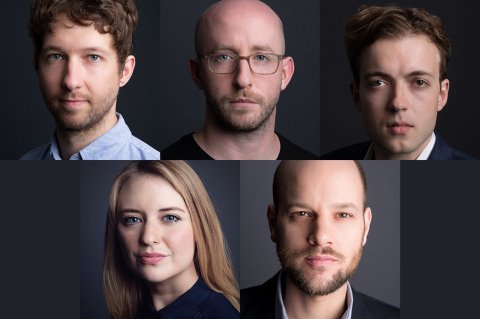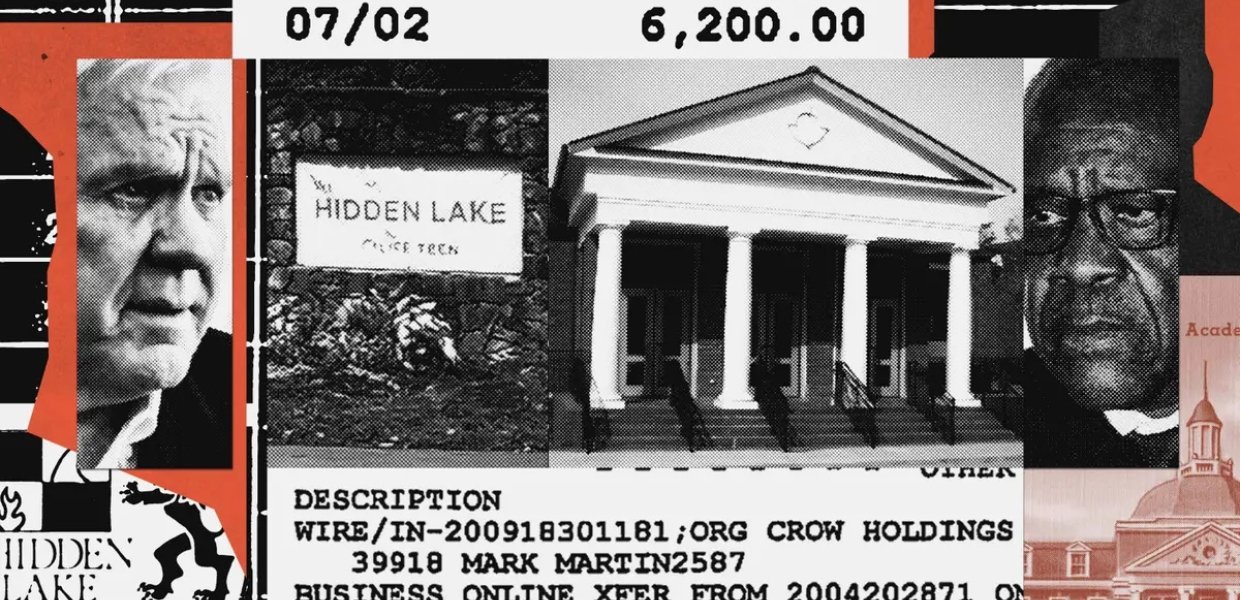When ProPublica reporter Justin Elliott began to investigate questions about influence and ethics surrounding the nation’s highest court he was shocked by the scale of his findings.
“We started poking around and found a few interesting things,” Elliott said. “But after the first story was published about Justice Clarence Thomas and billionaire Harlan Crow, we got a flood of tips.”

Elliott, together with ProPublica’s Joshua Kaplan, Brett Murphy, Alex Mierjeski and Kirsten Berg, scoured leads from fishing licenses, private yacht schedules, photos posted on social media and university archives and interviewed hundreds of people, from Koch network operatives to private jet pilots to Bohemian Grove valets to an Indonesian scuba instructor.
The reporters ultimately exposed the most serious ethical scandal in the modern history of the U.S. Supreme Court, revealing lavish travel and financial support that wealthy businessmen provided to the court’s current longest-serving justice.
For the resulting series, “Friends of the Court,” the ProPublica team has won the 2024 Selden Ring Award for Investigative Reporting. The annual award, one of the foremost honors in investigative journalism, has been presented by the USC Annenberg School of Journalism for 35 years. The $50,000 prize honors investigative journalism that informs the public about major problems and corruption and yields concrete results.
“For decades we have witnessed the importance of tenacious reporting that creates avenues for accountability and justice,” USC Annenberg Dean Willow Bay said. “This year’s winner and all of the entries demonstrate that the future of investigative journalism is in good hands and we are deeply honored to have partnered with the Ring Foundation to once again recognize the very best in the field.”
Unlike other federal judges and the executive and legislative branches, the Supreme Court had no code of conduct; a lax system had allowed jurists to omit relevant gifts and personal relationships from their annual financial disclosures. Without the help of the Freedom of Information Act, which does not apply to the judiciary, the ProPublica reporters were met with some challenges. An early breakthrough for the team was when they realized that a lot of the luxury travel that was being provided to Justices Thomas and Alito involved a large number of service workers.
“I want to express my gratitude and appreciation to all the people that spoke to us, both named and unnamed, for these stories,” Elliott said. “They all came from different walks of life and in some cases were taking risks, but they spoke to us because they believed in the public interest of these stories and the need to hold public officials accountable.”
ProPublica’s blockbuster findings reverberated around the world. Dozens of members of Congress pushed for ethics reform, the Senate held hearings, and the Supreme Court adopted an ethics code for the first time in its 234-year history.
“This was an important story for us to cover given the obvious power that the court wields over all of our lives,” Elliott said. “It should be subject to the same kind of investigative scrutiny that we apply to the rest of the parts of the government.”
This year’s Selden Ring Award panel included returning judges Alexandra "Alex" Zayas, deputy managing editor, ProPublica; Sarah Stillman, staff writer, The New Yorker and Sewell Chan, editor-in-chief, The Texas Tribune; with first-time judges Kimbriell Kelly, assistant managing editor and Washington Bureau Chief, Los Angeles Times; Ken Bensinger, politics reporter, The New York Times; Geoffrey King, executive editor, Open Vallejo; and Norberto Santana, founder and editor-in-chief, Voice of OC.
“We are incredibly grateful for the excellent work of our judging panel,” said Gordon Stables, director of USC Annenberg’s School of Journalism. “At a moment of so much turmoil with news organizations, it is incredibly heartening to see some of the best reporters and editors devoting their time to recognize and elevate the work of their peers. They took on an incredibly challenging task of narrowing down a highly competitive collection of 74 entries representing the very best of impactful investigative journalism over the last year.”
The judges collectively agreed that anyone doubting the impact of journalism today should read the dozens of entries submitted for the Selden Ring Award.
"From a local paper’s outsized effort to prevent the sudden deaths of high school football players, to a large-scale collaboration exploring unjust prosecutions of pregnant women, to the comprehensive accounting of the deaths of assisted-living residents who wandered away, to a jaw-dropping exposé of unfettered sheriffs and their violent deputies, journalists stepped in where guardrails had failed,” the judges wrote in a statement. “They exposed wrongdoing by energy companies, medical device makers, health insurers and officials from the island nation of Cyprus to the California city of Vallejo. Their findings resounded across the world, prompting new policies and indictments, government investigations and class-action lawsuits. We have no doubt that because of tremendous work done last year, lives will be saved.”
Since 1989, the Ring Foundation has partnered with the USC Annenberg School of Journalism to present the Selden Ring Award for Investigative Reporting. The $50,000 annual award was established with the support of Southern California businessman and philanthropist Selden Ring. It underscores the critical importance of investigative journalism in today’s society.
In addition to naming the winner, the judges also recognized the work of two finalists.
The New York Times, Alone and Exploited
Jurors described the work of reporter Hannah Dreier as “epic,” “devastating” and “courageous” as she meticulously documented with sweeping detail through the use of public records, leaked documents, sourcing, and litigation, the dangerous and even fatal conditions of immigrant children working illegally in every state and in many cases at some of the nation’s largest corporations. As the investigation unfolded, businesses warned staff about Dreier, some passing out photos of her, as the Department of Labor prohibited inspectors from talking to her. The comprehensive examination of child labor — the result of a nearly two-year investigation — resulted in an immediate impact at the federal, state and corporate levels. The Department of Health and Human Services added more than $1 billion in support of migrant children, Congress introduced 16 bills, the Agriculture Department retrained 8,000 inspectors and at least six states passed new laws. Multiple federal and state investigations were launched — including by Congress, the Labor Department, and Health and Human Services — as corporations enacted stricter hiring practices and ordered unannounced audits at their workplaces.
STAT, Denied by AI: Consequences for Sick and Vulnerable Americans
In a time of rapid technological change, STAT took on a new and little-understood advance at the bleeding edge of the healthcare landscape: artificial intelligence. What it found was alarming: health insurance giant UnitedHealth has been boosting its bottom line by using obscure algorithms to make critical — and often devastating — healthcare coverage decisions for senior citizens with Medicare Advantage plans. Through dogged and innovative reporting, drawing on non-public corporate documents, company insiders, and experts on both healthcare and artificial intelligence, journalists Casey Ross and Bob Herman teased out the intricacies of a hidden computer code that decided, among other things, how long patients could be hospitalized, regardless of their actual condition. To bring home the impact of the technology, they provided moving examples of human suffering, such as an 85-year-old woman with an agonizing broken shoulder whose care was abruptly terminated because the algorithm said it should be. Their work prompted multiple lawsuits, a Senate investigation and a rare probe by the Center for Medicare and Medicaid Services, which said it would audit denials by Medicare Advantage providers including UnitedHealth.
Special Citations — The Washington Post, The Collection, and ProPublica, The Repatriation Project
Exceptional reporters can, at times, step in to do the work of historical reckoning that major institutions have failed to do. That is the case with a distinctive duo of investigations, “The Repatriation Project” and “The Collection,” that unearthed the racist legacy behind prestigious museum holdings. In “The Collection,” Post journalists revealed the Smithsonian’s unreconciled legacy of harvesting bodies and organs from indigenous people and communities of color — looting from graveyards, morgues, hospitals, and more, across several centuries and more than eighty countries. ProPublica journalists studied the failure of museums, more than three decades after the passage of the federal Native American Graves Protection and Repatriation Act, to return human remains and sacred items to the communities from whom they were extracted. The investigations were immense and innovative; reporters engaged readers with powerful visuals and searchable databases. They forced a confrontation with the racism of the past — and with the policies of the present. In response, museums not only apologized but sped up their repatriation efforts, and put new resources behind the long-delayed returns.
